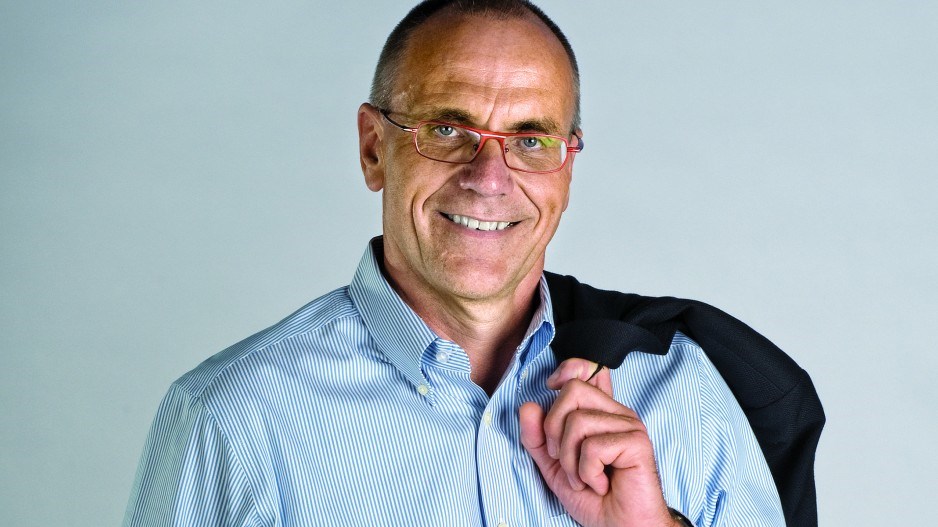BC companies may be leaders in developing fuel-cell technology, but B.C. continues to lag in fuel-cell vehicle adoption.
Despite being Canada’s largest fuel-cell technology hub, there are currently only eight hydrogen fuel-cell (HFC) cars on the road here, compared with 2,000 in California and 5,000 in Japan.
Trying to address that lag is just one of Andreas Truckenbrodt’s jobs.
Truckenbrodt is the new CEO of the Canadian Hydrogen and Fuel Cell Association, which represents and lobbies on behalf of Canadian hydrogen and fuel-cell companies – a sizable number of which are clustered in B.C.
An aeronautical engineer from Germany, Truckenbrodt is the former CEO of the Automotive Fuel Cell Cooperation (AFCC), which was spun out of Ballard Power Systems (TSX:BLD) when Daimler AG and Ford Motor Co. (NYSE:F) acquired Ballard Power’s fuel-cell business for automobiles in 2008.
The adoption of HFC passenger cars has taken a lot longer than anyone in the industry ever thought it would, which is why Ballard got out of that business nearly 10 years ago to focus on making fuel-cell modules for buses, light rail and stationary power.
But, thanks to new zero-emissions standards in places like California, vehicle manufacturers like Toyota (NYSE:TM) and Hyundai (Nasdaq:HYMTF) are now starting to mass-produce HFC cars. Getting your hands on one in B.C. is still a challenge, however.
“The hydrogen fuel-cell industry has had its ups and downs, absolutely,” Truckenbrodt said. “What we see recently – and recently means in the last two, three years – is definitely an upswing, and the opportunities are significant. And that goes across many sectors.
“We mostly talk transportation, which means cars and trucks, but there’s also really good applications in stationary fuel cells, like power supplies for houses, and the other big topic is energy storage.”
Ballard, which has not turned a profit since it started developing fuel cells in 1989, just recently published financials that show the company was just $1.2 million shy of profitability by the end of the second quarter.
The company recorded a 50% revenue increase in the second quarter, finishing with a net loss of $1.2 million, compared with a net loss of $4.1 million in Q2 2016.
Ballard has developed a burgeoning market in China for the fuel cells it makes for buses and light rail. It recently shipped five fuel-cell modules that will power China’s first fuel-cell-powered tram, and is working with Guangdong Synergy Hydrogen Power Technology Co. on a joint venture to build a new fuel-cell stack manufacturing plant in China.
In addition to Ballard and the AFCC, which develops fuel-cell stacks for cars, there are more than a half-dozen other smaller B.C. companies that are in one way or another involved in the hydrogen fuel-cell space, including Loop Energy, Greenlight Innovation, Quadrogen Power Systems, Hydrogen in Motion (H2M), CSA Group, Tandem Technologies, Terrella Energy Systems and Hydrogen Technology and Energy Corp. (HTEC).
BC Hydro’s energy research and testing lab, Powertech Labs in Surrey, is also an important part of B.C.’s hydrogen hub. It currently hosts the only hydrogen fuelling station in the Lower Mainland.
Although manufacturers like Toyota and Hyundai are now producing fuel-cell cars, they do not sell them in British Columbia yet because there is still a lack of hydrogen fuel production and fuelling infrastructure here.
“The car companies cannot try to sell cars if there is no station to fill the car,” Truckenbrodt said.
“On the other hand, the station guys, they don’t want to build the stations if they have not some confidence that the cars would show up.”
It’s not just the lack of fuelling infrastructure that is preventing an uptake in fuel-cell vehicles here. There is still a lack of local hydrogen production. Attempts to build a new plant here that would derive hydrogen from the byproducts of chemical plants in North Vancouver never materialized.
HTEC is now focused on producing hydrogen from water through electrolysis. It has one small electrolysis system at Powertech Labs that can produce enough hydrogen from water and grid power to supply 25 cars with fuel, and it is planning to build more such fuelling stations.
“There is definitely activity by HTEC on developing infrastructure, with plans to be announced in the fall,” said company president Colin Armstrong.
HTEC is also building an electrolysis fuelling station in California, which has plans to increase the number of hydrogen fuel-cell cars on the road to 4,000 from 2,000 by the end of 2018.




